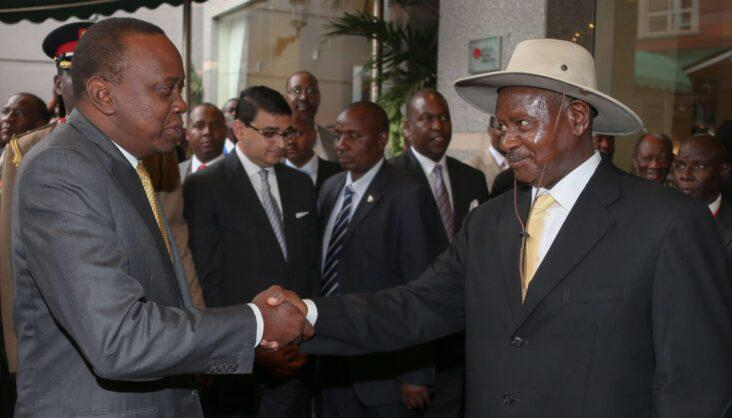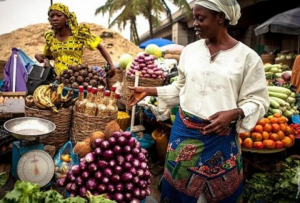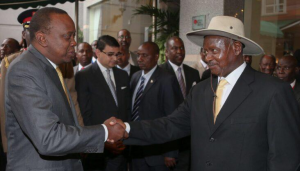Kenya’s President Uhuru Kenyatta shakes hands with Ugandan President Yoweri Museveni in Nairobi, Kenya on July 25, 2014/ Pacific Press.
NAIROBI Kenya, Dec 15- The trade row between Kenya and Uganda is set to escalate further following Uganda’s announcement to restrict Kenya’s raw and processed farm produce from entering its market.
On Monday, Ugandan Minister for East African Affairs Rebecca Kadaga stated that Uganda’s Cabinet has directed the Agriculture ministry to identify and list Kenyan products that will then be banned by the Ugandan government “in a short time.”
”We have been too patient. In the past, we have not reciprocated, but now we are going to. This has gone on for too long and within a short time they too will understand what we are going through,” Kadaga said.
Kenya and Uganda have for a long time been embroiled in a trade dispute.
The most recent hostilities between the two East African Community states began brewing in December 2019, when Kenya stopped importing Ugandan milk, particularly the Lato brand.
In July 2020, Kenya followed up with a ban on Ugandan sugar, against an earlier agreement to increase Uganda’s sugar exports to Kenya.
Uganda had introduced discriminative excise duties under the Excise Duty Amendment Act 2017.
However, in April, Kenya’s Cabinet Secretary for Trade Betty Maina led a delegation to Uganda seeking assurance that the sugar imported to the EA state was wholly produced in Uganda.
Kenya agreed to allow 90,000 tonnes of sugar from her landlocked neighbour as soon as the verification mission on the country of origin was completed.
As part of the pact, Uganda committed to abolishing the 20 percent excise duty on furniture and 18 percent value-added tax (VAT) on exercise books manufactured in Kenya with effect from July 1.
Additionally, Uganda undertook to abolish the 18 percent VAT charged on processed poultry meat exported from Kenya and zero-rate drugs manufactured in Kenya with effect from July 1.
Despite these pledges, both countries have reneged on implementing some of them, triggering intermittent disputes such as the latest one on the sugar trade.
In September, the Sugar Directorate in Nairobi said that traders will only be allowed to import 18,923 tonnes of sugar from Uganda.
This was a direct contradiction of an agreement between the two countries in April where Kenya agreed to allow 90,000 tonnes of sugar from her landlocked neighbour as soon as the verification mission on the country of origin was completed.
Players within Uganda’s poultry industry this week petitioned their government over Kenya’s ban of Uganda’s poultry products from their market for nearly a year now. Kenya also stopped all chicken, meat and egg imports on grounds that it needed to support its “producers to recover from disruptions in their livestock enterprises occasioned by Covid-19”.
The dispute between the two countries has resulted in a depreciation of trade in recent times, with the value of imports from Uganda dropping 34 percent between January and August.
Trade data from the Central Bank of Kenya indicates that the imports from Uganda dropped from a record high of Sh3.2 billion ($29 million) in February to Sh2.09 billion ($19 million) in the review period, hitting a seven-month low.
Kenya is Uganda’s biggest trade partner. CBK data shows that Kenya Exports to Uganda stood at Sh76.1 billion in 2020, while Uganda Exports to Kenya stood at Sh52.6 billion during the same period.
Most of Uganda’s imports pass through Kenya but the former has been wooing Tanzania in recent days.
In April, Uganda opted to join Tanzania on the East African Crude Oil Pipeline project, ditching Kenya. It also backed out on Kenya’s Standard Gauge Railway project.



















